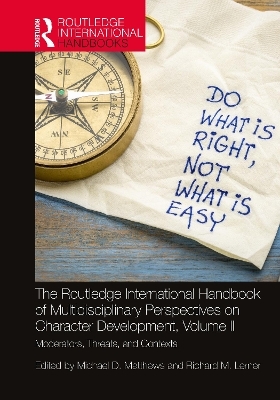
The Routledge International Handbook of Multidisciplinary Perspectives on Character Development, Volume II
Routledge (Verlag)
978-1-032-17244-6 (ISBN)
Drawing from philosophy, religion, biology, behavioral and social sciences, and the arts, The Routledge International Handbooks of Multidisciplinary Perspectives on Character Development, Volumes I and II, present cutting-edge scholarship about the concept of character across the life span, the developmental and contextual bases of character, and the key organizations of societal sectors, within and across nations, that promote character development in individuals, families, and communities.
This second volume, Moderators, Threats, and Contexts, focuses on the moderators and covariates of character development with chapters pertaining to cultural- and contextual-based exemplars of character development; grit, achievement, and resilience; hope for the future; and parenting and self-regulation. With contributions from international experts, Volume II goes on to discuss threats to moral, positive, or virtuous character development, as well as the different contexts wherein the character is studied and promoted. Special attention is paid to the centers of excellence at universities around the world that specialize in character development research and character education.
This comprehensive publication is an essential reference for researchers and graduate students in behavioral sciences, biology, philosophy, theology, and economics, as well as practitioners leading or evaluating character education or character development programs around the world.
Find Volume I: Conceptualizing and Defining Character here: www.routledge.com/9781032169491
Michael D. Matthews, Ph.D., is Professor of Engineering Psychology at the United States Military Academy. He has been a military psychologist since 1980. In the past 40 years, he has served on active duty as an Air Force officer (as a behavioral sciences officer), as a psychology professor at Drury University, as a research psychologist for the Army Research Institute, and, since 2000, in his current capacity at West Point. Richard M. Lerner, Ph.D., is the Bergstrom Chair in Applied Developmental Science and the Director of the Institute for Applied Research in Youth Development at Tufts University. He went from kindergarten through Ph.D. within the New York City public schools, completing his doctorate at the City University of New York in 1971 in developmental psychology. Lerner has more than 800 scholarly publications, including more than 80 authored or edited books.
Section I: Moderators and Covariates of Character Development 1. Culturally Sensitive and Contextually Adapted Exemplars of Character Development: Implications for Reimagining Frameworks 2. The Role of Grit in Achievement and Resilience: A Comprehensive Review 3. Organizational Grit as a Cultural Perspective 4. Hope for the Future 5. Parenting as Panacea: Toward Generational Advancements of Early Character Virtues and Eventual Civic Responsibility 6. Resilience 7. Self-regulation: A Character Development Perspective; Section II: Threats to Character Development 8. Can Exemplars Promote Character Development in the Wake of Adversity? 9. Why Good People Fail at Character: The Character Risk Model 10. What’s Wrong with the World Anyway? Psychological Origins of a Collective Failure of Humanity 11. Democratic Character and Virtues: Developmental Responses to Group Conflict and Oppression 12. Racism and Positive Youth Development; Section III: Contexts of Character Development 13. The Jubilee Centre for Character and Virtues 14. The Center for Character and Citizenship 15. The Center for Parent and Teen Communication at Children’s Hospital of Philadelphia 16. The Institute for Applied Research in Youth Development: Understanding What Goes Right in the Lives of Youth 17. Institute for the Study of Human Flourishing: A Cautionary Tale 18. The Oxford Character Project 19. The Montclair State University Institute for Research on Youth Thriving and Evaluation 20. The Stanford Center on Adolescence 21. Wake Forest University’s Program for Leadership and Character: A Case Study 22. The Application of Character Measurement and Development within Organizations 23. International Development Agencies and Their Emerging Role in Adolescent Character Development: Reflections and Opportunities 24. International Faith-based Organizations: Integrating Science and Ideology 25. Children’s Media and Development: Interdisciplinary Approaches, Considerations, and Potential 26. Character Development in Youth Programs: Lessons from Developmental Science Research and Practice 27. Philanthropic Approaches to Character Development 28. The Templeton Philanthropies 29. Character First, then Pathway to Excellence: A Case Study of NPX Point Avenue K12 Education Programs in Hanoi, Vietnam 30. Intellectual Virtues Academy of Long Beach: Integrating Intellectual Virtues into the DNA of a School 31. A Developmental Journey: The Center for Character and Leadership Development at the United States Air Force Academy 32. Leaders of Character, The Coast Guard Academy Way 33. Building Trusted Army Professionals: Character Development at West Point 34. Leadership and Character Development at the U.S. Naval Academy; Section IV: Conclusions and Implications 35. Character Virtue, Social Science, and Leadership: Consequences of Ignoring Practice 36. Progress, Challenges, and Promise in Understanding, Measuring, and Educating Character 37. Character Development: Then, Now, and Next
| Erscheinungsdatum | 10.04.2024 |
|---|---|
| Reihe/Serie | Routledge International Handbooks |
| Zusatzinfo | 10 Tables, black and white; 12 Line drawings, black and white; 24 Halftones, black and white; 36 Illustrations, black and white |
| Verlagsort | London |
| Sprache | englisch |
| Maße | 174 x 246 mm |
| Gewicht | 1542 g |
| Themenwelt | Geisteswissenschaften ► Psychologie ► Allgemeine Psychologie |
| Geisteswissenschaften ► Psychologie ► Entwicklungspsychologie | |
| ISBN-10 | 1-032-17244-4 / 1032172444 |
| ISBN-13 | 978-1-032-17244-6 / 9781032172446 |
| Zustand | Neuware |
| Informationen gemäß Produktsicherheitsverordnung (GPSR) | |
| Haben Sie eine Frage zum Produkt? |
aus dem Bereich


